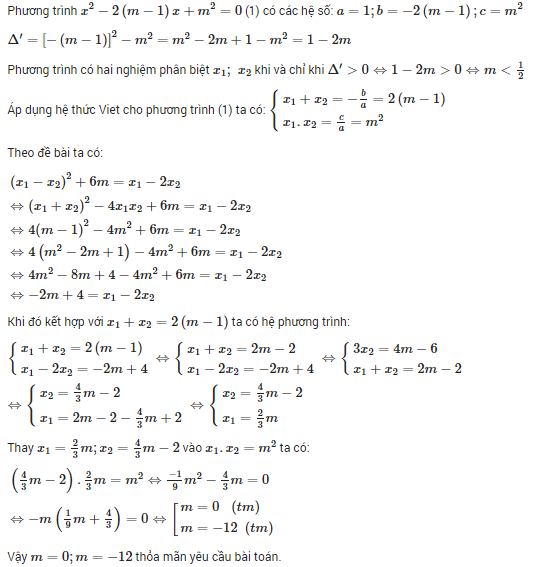tổng S các giá trị của m để phương trình x^2 -2(m+1)+m^2+2m-8=0 có hai nghiệm phân biệt x1,x2. Thỏa mãn 3x1-2x2=0 (càng chi tiết càng tốt)
Hãy nhập câu hỏi của bạn vào đây, nếu là tài khoản VIP, bạn sẽ được ưu tiên trả lời.


\(x^2-2\left(2m+1\right)x+4m^2+4m=0\)
Để pt có hai ng pb\(\Leftrightarrow\Delta>0\)
\(\Leftrightarrow4>0\left(lđ\right)\)
\(\Rightarrow\)Pt luôn có hai ng pb với mọi m
\(\left\{{}\begin{matrix}x_1=\dfrac{2\left(2m+1\right)+\sqrt{4}}{2}=2m+2\\x_2=\dfrac{2\left(2m+1\right)-\sqrt{4}}{2}=2m\end{matrix}\right.\)
Có \(\left|x_1-x_2\right|=x_1+x_2\)
\(\Leftrightarrow\left|2m+2-2m\right|=2m+2+2m\)
\(\Leftrightarrow2=4m+2\)
\(\Leftrightarrow m=0\)
Vậy...

\(\Delta=\left(2m+1\right)^2-4\left(m^2+m-2\right)=9>0;\forall m\)
Phương trình luôn có 2 nghiệm pb với mọi m
Theo hệ thức Viet: \(\left\{{}\begin{matrix}x_1+x_2=2m+1\\x_1x_2=m^2+m-2\end{matrix}\right.\)
\(x_1\left(x_1-2x_2\right)+x_2\left(x_2-2x_1\right)=9\)
\(\Leftrightarrow x_1^2+x_2^2-4x_1x_2=9\)
\(\Leftrightarrow\left(x_1+x_2\right)^2-6x_1x_2=9\)
\(\Leftrightarrow\left(2m+1\right)^2-6\left(m^2+m-4\right)=9\)
\(\Leftrightarrow2m^2+2m-4=0\)
\(\Rightarrow\left[{}\begin{matrix}m=1\\m=-2\end{matrix}\right.\)

Ta có \(\Delta'=\left(m-2\right)^2+m-2\)
\(=m^2-4m+4+m-2\)
\(=m^2-3m+2\)
Để pt có 2 nghiệm phân biệt thì \(\Delta'>0\Leftrightarrow\orbr{\begin{cases}m< 1\\m>2\end{cases}}\)
Teo Vi-et \(\hept{\begin{cases}x_1+x_2=2\left(m-2\right)\\x_1x_2=-m+2\end{cases}}\)
Ta có \(x_1+2x_2=2\)
\(\Leftrightarrow\left(x_1+x_2\right)+x_2=2\)
\(\Leftrightarrow2\left(m-2\right)+x_2=2\)
\(\Leftrightarrow2m-4+x_2=2\)
\(\Leftrightarrow x_2=6-2m\)
Ta có \(x_1+x_2=2\left(m-2\right)\)
\(\Leftrightarrow x_1+6-2m=2m-4\)
\(\Leftrightarrow x_1=4m-10\)
Thay vào tích x1 . x2 được
\(x_1x_2=-m+2\)
\(\Leftrightarrow\left(4m-10\right)\left(6-2m\right)=-m+2\)
\(\Leftrightarrow24m-8m^2-60+20m=-m+2\)
\(\Leftrightarrow8m^2-45m+62=0\)
Có \(\Delta=41\)
\(\Rightarrow\orbr{\begin{cases}m=\frac{45-\sqrt{41}}{16}\left(tm\right)\\m=\frac{45+\sqrt{41}}{16}\left(tm\right)\end{cases}}\)

b: Δ=(-2m)^2-4(m^2-2m+2)
=4m^2-4m^2+8m-8=8m-8
Để pt có 2 nghiệm phân biệt thì 8m-8>0
=>m>1
x1^2+x2^2=x1+x2+8
=>(x1+x2)^2-2x1x2-(x1+x2)=8
=>(2m)^2-2(m^2-2m+2)-2m=8
=>4m^2-2m^2+4m-4-2m=8
=>2m^2+2m-12=0
=>m^2+m-6=0
=>(m+3)(m-2)=0
mà m>1
nên m=2

Để phương trình 1 có 2 nghiệm phân biệt
=> \(\Delta,>0\) <=> \(\left[-\left(m-1\right)\right]^2-\left(-2m+5\right)>0\)
<=>\(\left[{}\begin{matrix}m>2\\m< -2\end{matrix}\right.\)
=> Theo hệ thức Vi ét ta có
\(\left\{{}\begin{matrix}x_1+x_2=2\left(m-1\right)\circledast\\x_1.x_2=-2m+5\circledast\circledast\end{matrix}\right.\)
Theo bài ra ta có
\(x_1-x_2=-2\circledcirc\)
Từ \(\circledast vaf\circledcirc\) ta có hệ pt
\(\left\{{}\begin{matrix}x1+x2=2m-2\\x1-x2=-2\end{matrix}\right.\) <=>\(\left\{{}\begin{matrix}x1=m-2\\x2=m\end{matrix}\right.\)
Thay x1 và x2 vào \(\circledast\circledast\)ta dc
\(\left(m-2\right)m=-2m+5\)
<=> m=\(\left[{}\begin{matrix}-\sqrt{5}\\\sqrt{5}\end{matrix}\right.\left(tm\right)\)
Vậy ...

1) Thay m=2 vào (1), ta được:
\(x^2-2\cdot3x+16-8=0\)
\(\Leftrightarrow x^2-6x+8=0\)
\(\Leftrightarrow\left(x-2\right)\left(x-4\right)=0\)
\(\Leftrightarrow\left[{}\begin{matrix}x-2=0\\x-4=0\end{matrix}\right.\Leftrightarrow\left[{}\begin{matrix}x=2\\x=4\end{matrix}\right.\)
Vậy: Khi m=2 thì (1) có hai nghiệm phân biệt là: \(x_1=2\); \(x_2=4\)
b) Ta có: \(\Delta=4\cdot\left(2m-1\right)^2-4\cdot1\cdot\left(8m-8\right)\)
\(\Leftrightarrow\Delta=4\cdot\left(4m^2-4m+1\right)-4\left(8m-8\right)\)
\(\Leftrightarrow\Delta=16m^2-16m+4-32m+32\)
\(\Leftrightarrow\Delta=16m^2-48m+36\)
\(\Leftrightarrow\Delta=\left(4m\right)^2-2\cdot4m\cdot6+6^2\)
\(\Leftrightarrow\Delta=\left(4m-6\right)^2\)
Để phương trình có hai nghiệm phân biệt thì \(\left(4m-6\right)^2>0\)
mà \(\left(4m-6\right)^2\ge0\forall m\)
nên \(4m-6\ne0\)
\(\Leftrightarrow4m\ne6\)
hay \(m\ne\dfrac{3}{2}\)
Vậy: Để phương trình có hai nghiệm phân biệt thì \(m\ne\dfrac{3}{2}\)


chữ xấu vậy trời😅